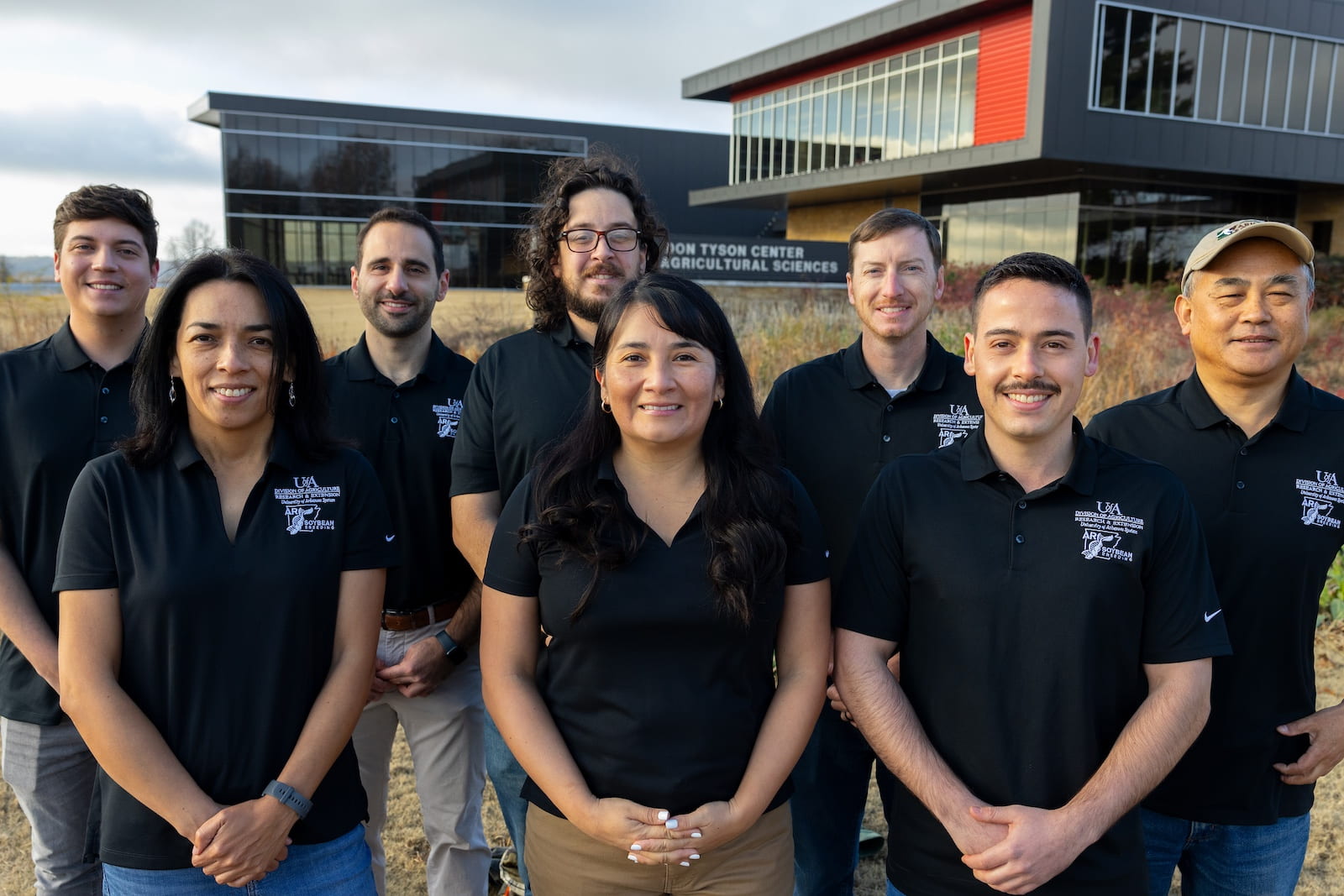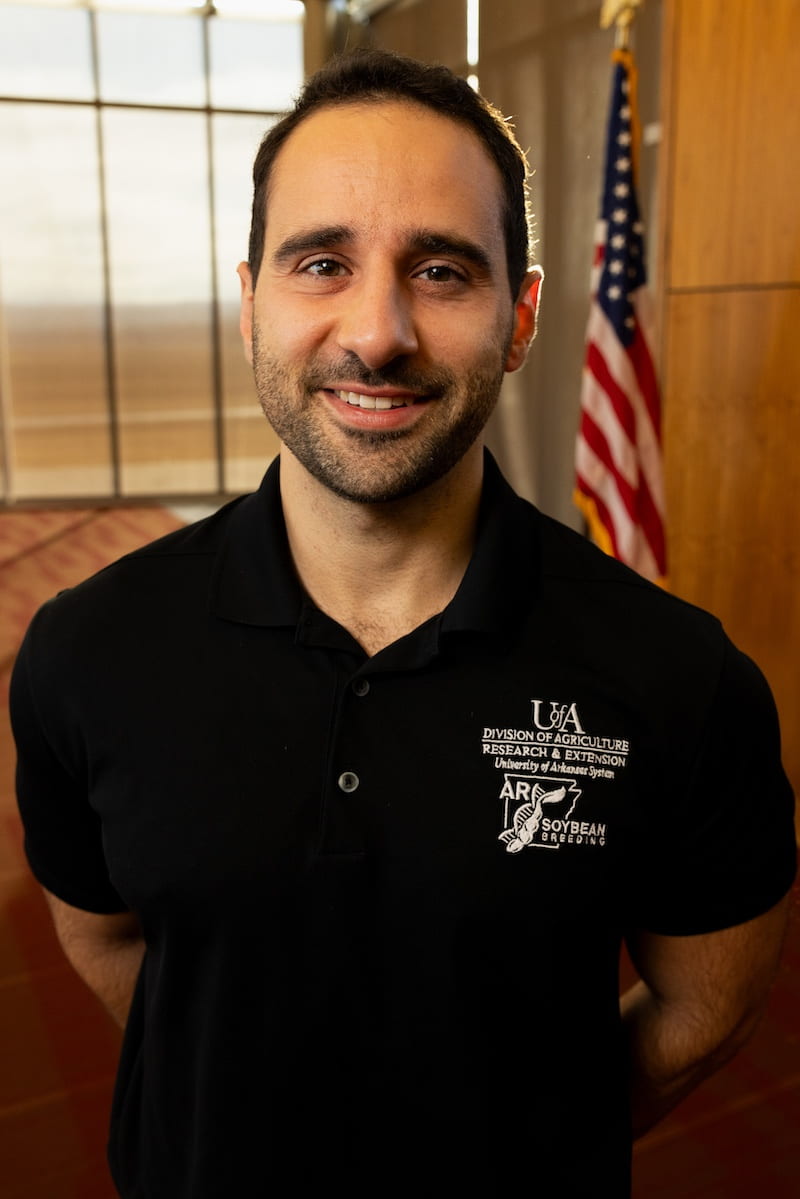2024 Southern Soybean Breeders Tour to Spotlight Mid-South’s Opportunities, Challenges
Southern Soybean Breeders Tour set Sept. 3-5 in Memphis, Tennessee
Online registration is now open
By Jenifer Fouch – Aug. 14, 2024

Jonathan David Mendoza Garcia, Andrea Acuna-Galindo, Caio Canella Vieira, Derrick Jerome Harrison, Liliana Florez-Palacios, Daniel Rogers, Rafael Gonçalves Marmo, Chengjun Wu.
FAYETTEVILLE, Ark. — The Arkansas Soybean Breeding program invites all breeders, researchers, growers, and industry professionals to the 2024 Southern Soybean Breeders Tour for an in-depth exploration of the latest research, trials and innovations in soybean breeding across the Mid-South.
This year’s event will take place from Sept. 3-5 in Memphis, Tennessee, focusing on the unique challenges and opportunities of soybean production in the Mid-South region.
The Soybean Breeders Tour is hosted by the University of Arkansas System Division of Agriculture and the University of Missouri’s Fisher Delta Research, Extension, and Education Center.
Attendees will have the chance to learn from top experts in soybean genetics, agronomy, pathology and weed management, visit research facilities and fields to see cutting-edge breeding techniques in action, and connect with fellow researchers, graduate students, and industry leaders.
Soybean breeder Caio Canella Vieira is the lead of the Arkansas Soybean Breeding team and an assistant professor in the crop, soil and environmental sciences department.
Soybean breeder Caio Canella Vieira, assistant professor in the crop, soil and environmental sciences department and researcher for the Arkansas Agricultural Experiment Station, the research arm of the Division of Agriculture, is the organizing co-chair of the event.
“The Southern Soybean Breeders Tour has been a key event in the South for nearly 40 years,” Vieira said. “This event is perfect for anyone interested in learning more about agricultural production in the Mid-South. Our goal this year is to provide an immersive experience to truly understand the challenges and opportunities of agriculture in this region.”
Vieira leads the Arkansas Soybean Breeding program, which develops and releases conventional and herbicide-resistant soybean cultivars tailored to the needs of Arkansas growers.
“We are fortunate to work in a field where many research findings are translated into practical field solutions,” he said. “Events like this allow us to share recent advancements with growers and the research community, sparking thoughtful and fruitful discussions that can lead to real-world applications and innovations.”
Arkansas is the 10th biggest producer of soybeans in the country, and the crop remains a top contributor to the state’s economy. According to the latest Arkansas Agriculture Profile, in 2021, soybeans generated the highest export value for the state, bringing in $911 million.
That same year, soybeans were Arkansas’s second top commodity in terms of cash farm receipts, bringing in $1.6 billion, over 15 percent of the total Arkansas agricultural cash farm receipts.
Soybeans are the top crop in Missouri in both acreage and value and ranks seventh nationally, according to the University of Missouri. The Missouri crop is valued at $2.5 billion. The value of the U.S. soybean crop was $45.7 billion.
Some of the presentations at 2024 Soybean Breeders Tour will include:
- Soybean Breeding for Flood Tolerance
- Managing Soybean Diseases and Nematodes
- Weed Management Issues in Mid-South Crops
- Advancing Soybean Resistance and Yield Through Photosynthesis
- Off-Target Dicamba Damage in Non-Xtend Soybean
- Breeding Strategies for Improving Soybean Seed Composition
- Impact of Furrow-Irrigated Rice on Rice/Soybean Rotation
Vieira will provide an update on soybean breeding in Arkansas and deliver the closing remarks along with Feng Lin, assistant professor at the University of Missouri and organizing co-chair of the tour.
Thanks to the support of this year’s sponsors, local farmers can attend the Field Days free of charge. Farmers can submit this registration form to register.
Please visit the 2024 Southern Soybean Breeders Tour website for more information about the event and to register.
To learn more about the Division of Agriculture research, visit the Arkansas Agricultural Experiment Station website. Follow us on 𝕏 at @ArkAgResearch, subscribe to the Food, Farms and Forests podcast and sign up for our monthly newsletter, the Arkansas Agricultural Research Report. To learn more about the Division of Agriculture, visit uada.edu. Follow us on 𝕏 at @AgInArk. To learn about extension programs in Arkansas, contact your local Cooperative Extension Service agent or visit uaex.uada.edu.
About the Division of Agriculture
The University of Arkansas System Division of Agriculture’s mission is to strengthen agriculture, communities, and families by connecting trusted research to the adoption of best practices. Through the Agricultural Experiment Station and the Cooperative Extension Service, the Division of Agriculture conducts research and extension work within the nation’s historic land grant education system.
The Division of Agriculture is one of 20 entities within the University of Arkansas System. It has offices in all 75 counties in Arkansas and faculty on three campuses.
Pursuant to 7 CFR § 15.3, the University of Arkansas System Division of Agriculture offers all its Extension and Research programs and services (including employment) without regard to race, color, sex, national origin, religion, age, disability, marital or veteran status, genetic information, sexual preference, pregnancy or any other legally protected status, and is an equal opportunity institution.

Soybean breeder Caio Canella Vieira is the lead of the Arkansas Soybean Breeding team and an assistant professor in the crop, soil and environmental sciences department.




